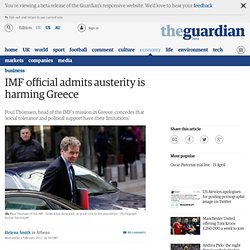

IMF official admits: austerity is harming Greece. A leading architect of the austerity programme in Greece – one of the harshest ever seen in Europe – has admitted that its emphasis on fiscal consolidation has failed to work, and said economic recovery will only come if the crisis-hit country changes tack and focuses on structural reforms.

Poul Thomsen, a senior International Monetary Fund official who oversees the organisation's mission in Greece, also insists that, contrary to popular belief, Athens has achieved a lot since the eruption of the debt crisis in December 2009. "We will have to slow down a little as far as fiscal adjustment is concerned and move faster – much faster – with the reforms needed to modernise the economy," he told the Greek daily Kathimerini, adding that the policy shift would be "reflected" in the conditions foreign lenders attached to a new rescue programme for Athens.
The Greek economy is projected to contract by over 5% this year; GDP has fallen almost 16% over the past three years. Austerity Reigns Over Euro Zone as Crisis Deepens. Petros Giannakouris/Associated Press In Athens, homeless people have a New Year’s Day meal.

Prime Minister Lucas Papademos has warned of a “very difficult year.” Saying that Europe was facing its “harshest test in decades,” Chancellor of Germany warned on that “next year will no doubt be more difficult than 2011” — a marked change in tone from a year ago, when she praised Germans for “mastering the crisis as no other nation.” Her blunt message was echoed in Italy, France and Greece, the epicenter of the debt crisis, where Prime Minister asked for resolve in seeing reforms through, “so that the sacrifices we have made up to now won’t be in vain.”
While the economic picture in the United States has brightened recently with more upbeat employment figures, Europe remains mired in a slump. Rather than the austerity measures now being imposed, Mr. In fact, economists and strategists on both sides of the Atlantic have been steadily ratcheting down their growth expectations for 2012.
From Greece: Declaration for the Defense of Society and Democracy. [The following statement was issued by a group of Greek academics regarding the ongoing crises in Greece.]

Greek society is suffering both from the crisis and the responses to it, which have reached a dead-end. Major social and political institutions that were created with enormous struggles and sacrifices in post-War Greece—social security, the public health care system, public education, public transport, the natural and urban environment, the right to live a safe existence, and various elemental goods and services that underwrite the very existence of an already curtailed and devalued Greek state—are all being utterly dismantled so that Greek society is now dying of asphyxiation. These dead-end responses rest on the blackmailing dilemma: austerity or bankruptcy? Yet, this is hardly a dilemma. It is rather a negative aggregate of both austerity and bankruptcy. How Austerity Is Killing Europe by Jeff Madrick. On the last day of 2011, a headline in The Wall Street Journal read: “Spain Misses Deficit Target, Sets Cuts.”

The cruel forces of poor economic logic were at work to welcome in the new year. The European Union has become a vicious circle of burgeoning debt leading to radical austerity measures, which in turn further weaken economic conditions and result in calls for still more damaging cuts in government spending and higher taxes. The European debt crisis began with Greece, and that nation remains the European Union’s most stricken economy. But it has spread inexorably to Ireland, Portugal, Italy, and Spain, and even threatens France and possibly the UK. It need not have done so. Over the past two years, the severe 2009 recession, which started in the US but spread across Europe, have imperiled the finances of one European country after another.
But this is pre-Great Depression economics. Sony Kapoor and Peter Bofinger. Overspending by governments, we have been told, triggered this crisis.

The cure thus lies in immediate austerity, hence last month's German-led push for a eurozone fiscal compact and the UK's pursuit of similar policies. But, as demonstrated by the experiences of Greece, Portugal and Spain, this course leads to biting, deep recessions and worsens public indebtedness. The IMF acknowledged as much last week. A focus on growth, not austerity, is the correct answer for Europe's ills. The case for "growth-friendly austerity" relies on the argument that public cuts are compensated for by consumers and businesses spending more, and with greater efficiency. When EU leaders next meet on 1 March, they must adopt a binding pledge to increase growth-enhancing public investments in the EU, outlining a firm strategy for funding these – in effect, a growth compact. The axe of austerity falls first and foremost on public investment, as it is easier to cut than other forms of public expenditure.